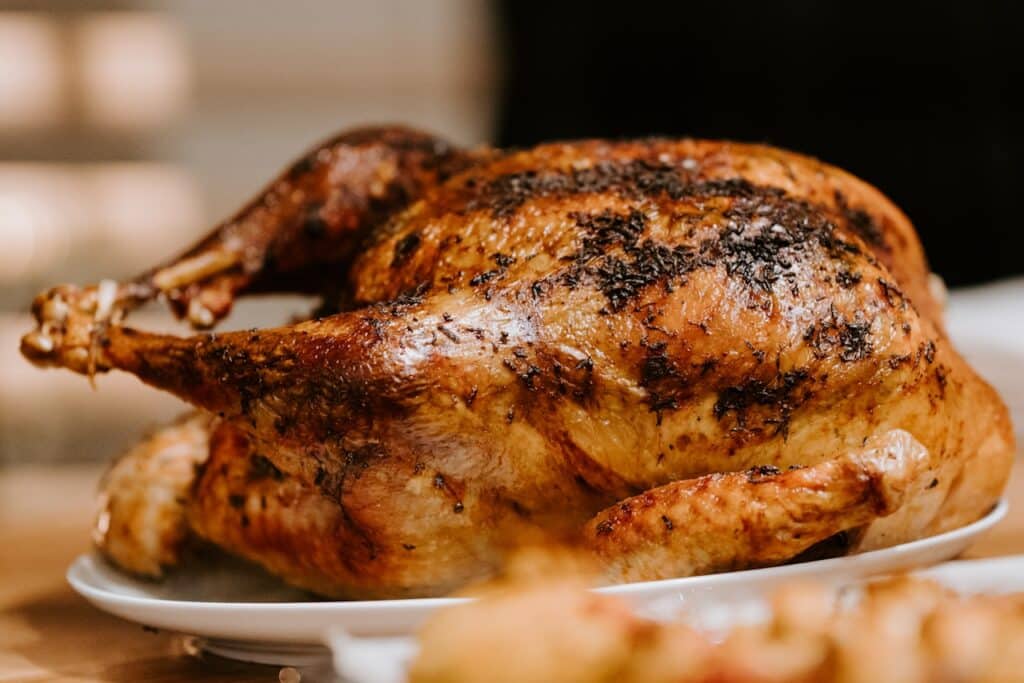It might be tempting to share a tasty piece of turkey with your furry friend, especially since dogs enjoy meat, especially on special occasions. However, it’s important to know that giving your dog turkey may not be the best idea. There are reasons why it’s not good for your dog, and why turkey bones can be risky for them.
Table of Contents

Can dogs eat turkey meat?
You might have noticed that turkey is a common ingredient in dog treats and food. Dogs can safely eat plain, cooked, and skinless white turkey meat in small amounts. Even ground turkey without additional ingredients or spices is generally okay for dogs.
However, the issue lies in certain aspects when it comes to sharing your Thanksgiving turkey with your furry friend. Here’s why, according to the American Kennel Club:
- Turkey Skin Fat: The fat in turkey skin can lead to pancreatitis, causing inflammation and swelling in the pancreas. This condition can be painful and result in serious health complications for your dog.
- Spices: The spices used to make turkey flavorful for humans can irritate your dog’s intestines, leading to digestive problems like vomiting and diarrhea.
- Garlic and Onions: Many turkeys are seasoned with garlic and onions, both of which are toxic to dogs.
- Processed Turkey Products: Cold cuts, turkey sausages, and other processed turkey delicacies often contain high levels of salt and preservatives. These can be harmful to your dog’s health and may cause stomach upset. If you do give your dog processed meat, keep it minimal and infrequent, such as when hiding medication in a small piece of turkey sausage.
- Remember, regularly giving your dog meat treats can be unhealthy and even dangerous
Can dogs eat turkey bones?
No doubt, dogs love to chew on bones, but according to the AKC, it can be harmful, especially when it comes to small poultry bones like those from turkey or chicken.
Chewing on bones can lead to various injuries, including:
- Mouth and Throat Injuries
- Choking or Throat Blockage
- Intestinal Blockage
- Stomach or Intestinal Injuries
- Constipation or Painful Bowel Movements
- Rectal Bleeding
In cases like intestinal blockage, emergency surgery may be necessary to save the dog. It’s essential to be cautious about letting dogs chew on small poultry bones to avoid these potential risks.

My dog swallowed a turkey bone: what should I do?
No matter how vigilant you are, your dog might seize the chance to sneak some forbidden turkey or a bone and swallow it before you can intervene. If this happens, stay calm.
Avoid trying to take the food away, especially if your dog tends to get aggressive around food. The AKC recommends reaching out to the vet if you suspect your dog has swallowed a bone. They can guide you to minimize the risk of injury.
Keep a close eye on your dog. Contact your vet promptly if your dog shows signs of difficulty or pain during defecation a few days after swallowing a bone, as bone fragments could cause rectal irritation. Other symptoms that warrant a vet consultation include:
- Lethargy
- Loss of appetite
- Vomiting
- Constipation or painful stools
- Bloody feces
- Bloated or distended abdomen
- Restlessness or difficulty calming down
If you want your dog to enjoy the taste of turkey safely, without the risk of bones or unhealthy ingredients, opt for a dog treat made with turkey meat. It keeps your dog happy, and you can have peace of mind knowing you’re not putting them in danger.
Can dogs eat turkey bacon?
Dogs can’t seem to resist the allure of bacon in any form. Some are so enthusiastic about it that they’ll swipe a tasty morsel from the kitchen counter or pilfer it straight from their owner’s plate! We all understand that traditional pork bacon isn’t the best choice for our furry friends due to its high fat and sodium content, not to mention the often less-than-ideal additives.
In the quest for a healthier option, many dog owners turn to turkey bacon. With lower levels of fat and sodium, it seems like a more sensible treat for our canine companions.
Is turkey bacon safe for dogs because it’s healthier, or do we need to be just as careful with it as we are with pork bacon?

Is turkey bacon safe for dogs?
The reality is that turkey bacon, despite its protein richness, isn’t a particularly healthy option for dogs. While it may boast lower levels of salt and fat compared to its pork counterpart, the nutritional distinction between the two isn’t significant.
Consequently, turkey bacon remains too high in sodium and fat to be deemed a wholesome addition to your pup’s daily diet. That said, it doesn’t mean your dog can’t occasionally savor a nibble or two (or even three!) of turkey bacon. The key is adhering to the 10% rule when treating your dog with turkey bacon or any other indulgence.
Giving your dog turkey bacon often can make them sick. Too much fat from eating it regularly might cause problems like pancreatitis, which can affect their overall health.
Moreover, overconsumption of turkey bacon may lead to obesity, triggering associated health problems such as diabetes and heart disease. Therefore, moderation is crucial when indulging your dog in such treats.